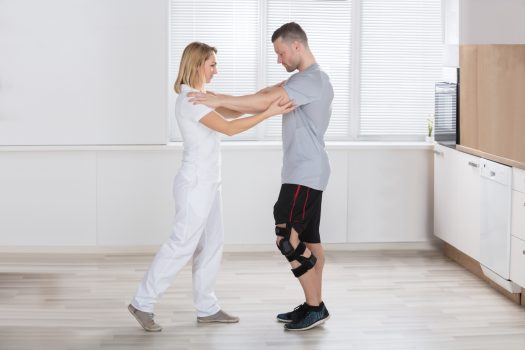 Physiotherapy and falls often go hand-in-hand. At Ability Action Australia, our clinicians often treat participants who are prone to stumbles and falls. Injuries such as wrist and hip fractures, concussion, pain and lengthy hospital stays are all common after a fall.
Physiotherapy and falls often go hand-in-hand. At Ability Action Australia, our clinicians often treat participants who are prone to stumbles and falls. Injuries such as wrist and hip fractures, concussion, pain and lengthy hospital stays are all common after a fall.
People living with disability and especially complex disability, where they may be living with two or more conditions and require high levels of support with daily life, are often at increased risk of falls.
But falls are not inevitable, and many are preventable. By designing an individualised plan that covers education, exercise prescription and safe activity, our NDIS registered Physiotherapists can reduce falls risk and keep people active and living independently for longer.
The causes and effects of falls
Older people are more likely to experience falls due to the normal ageing process, which includes weaker muscles, balance problems such as feeling unsteady when you walk, poorer eyesight, and cognitive problems like slower reaction times and dementia.
But younger people living with disability also experience falls. A disability such as a traumatic brain injury can affect the way we move around, and conditions such as intellectual disability have been found to lead to premature aging.
For people living with disability, falls risk factors include:
- A previous fall
- Cognitive impairment
- Psychological impairment
- Physical or medical impairment
- Medication use
- Personal factors and environmental factors
- Premature ageing in those with long-standing disability
Hazards found in the home related to poor lighting, slipping (wet areas such as in the shower and bathroom) and tripping (on general clutter, or rugs and worn carpets, electrical cords) also cause falls. Inappropriate footwear such as loose slippers are often a problem.
Even when falls don’t cause an injury, they often trigger a loss of confidence and lead to an ongoing fear of falling. Over time, this can lead to a person limiting their movements and reducing their activity, which further increases the risk of falling and may place further strain on caregivers.
Physiotherapy and falls: how we can help
As experts in movement and function, our Physiotherapists support people to reduce their falls risk through individual programs involving exercise prescription, assistive technology such as mobility aids, and education.
Our Physios can help you get back on your feet after a fall and develop a personalised Physiotherapy program to help prevent falls from reoccurring.
We can:
- Assess your environment to work out the causes of your fall
- Help you understand how to prevent falls by exercising, making your home safer, and eating well
- Prescribe exercises to work on your strength, balance and coordination
- Focus on muscle strengthening and muscle re-education to improve control, and resistance training for maintaining bone density
- Examine your home environment to look for ways you can include exercise in your daily life
- Talk to you about continuing the activities you enjoy along with a tailored exercise program
- Prescribe mobility aids such as walkers and walking sticks for longer trips out in the community
- Recommend modifications to your home
- Reduce your anxiety about taking a fall
- Work with a multidisciplinary team to ensure you get the best health outcomes
Real-life examples
Here are two examples where physiotherapy and fall prevention strategies have supported participants to reduce their falls, improve their confidence and help them engage in meaningful activities.
Example A:
Who: A 20-year-old man with SANDO syndrome — a severe form of sensory ataxic neuropathy, dysarthria, and ophthalmoplegia. Symptoms include myopathy, seizures, hearing loss, and progressive gait unsteadiness.
Clinician: Senior Physiotherapist, Margaret Huang
Area of difficulty: At his initial assessment, he struggled to walk up and down his flight of stairs at home. He would need two people assisting him and would take several rest breaks due to tiredness, leg weakness, and balance problems. This would often lead to falls on the staircase. He would also fall while standing up for over 30 seconds, and when walking less than five metres.
Intervention: Margaret has been working with him on a graded exercise program focusing on strength, balance, and proprioception (exercises to help stabilise a joint during static and dynamic functional tasks).
Outcome: He is now able to walk up and down the staircase without taking a rest break (still with two people assisting), stand for over five minutes (this is meaningful for him as it allows him to take part in taekwondo classes as he did before his diagnosis), and walk up to 20 metres without having a fall.
“When I first saw him, he and his family were struggling to accept that he may need an electric wheelchair and to move to assisted living due to his frequent falls. However, now they are a lot more optimistic about him working towards mobilising independently and safely, which is wonderful to see and be a part of!” Margaret says.
Example B:
Who: A young man in his 20s living with a traumatic brain injury
Clinician: Physiotherapy Team Leader, Alex Bush
Area of difficulty: He falls frequently as he walks quickly, and his balance is shaky
Intervention: Alex has been working with him on strengthening exercises and improving his balance and confidence. The methods she has used include incorporating games to encourage his walking and balance, as well as gradual progression to improve his confidence. Alex has also ensured he slows down his walking pattern by providing a new walking stick.
Outcome: The participant has been feeling much more confident and has now been walking outdoors independently with the walking stick to the shops. He feels much more independent and happier that he can carry out tasks by himself without help and also without feeling worried.
Contact our NDIS-registered Physiotherapists
If you have experienced a fall or you’re worried about doing so, get in touch with Ability Action Australia’s team of Physiotherapists today. We’ll collaborate closely with you to assess your needs and work through your goals together. Contact our friendly concierge service on 1800 238 958 or complete the request contact form and we’ll contact you at a time that suits.

